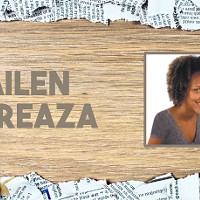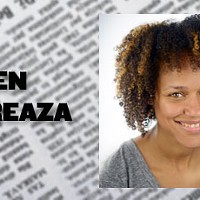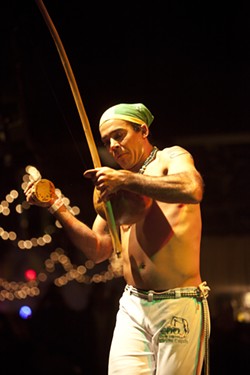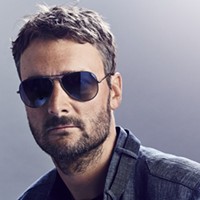Mestre Esquilo brings music-infused Brazilian martial art to Charlotte
Bruno Melo teaches classes daily at Cordão de Ouro on Central Avenue
By Ailen ArreazaWhen he was 10 years old, Bruno Melo went to the martial arts studio in his hometown of Belo Horizonte, in Brazil, to look for a Kung Fu class. "I wanted to be like Bruce Lee," he says, "but when I arrived they were doing Capoeira. As soon as I saw how they incorporated music into the game, I was hooked."
Now 33, Melo, who is known in the world of Capoeira as Mestre Esquilo, lives and performs in Charlotte. "I came for the first time to do a Capoeira workshop in March of 2011," he says from his home in the northwest part of town. "In June, I moved here with my family."
Melo, who has traveled to more than 23 countries showcasing Capoeira — the uniquely Brazilian fusion of dance and martial arts — was invited to Charlotte by a small group of enthusiasts who saw videos of him on YouTube. The city's warm weather and tranquil lifestyle reminded Melo of Belo Horizonte and, as a new father to triplets, he saw it as the perfect place to start a new life and seek out opportunities. In 10 months, he's already established a successful Capoeira studio and teaches classes daily at Cordão de Ouro on Central Avenue.
Playing to the beat
Mestre, or master, of Capoeira is not a title that's easy to come by. Melo became Mestre two years ago, after practicing the sport for 20 years. "It takes a long time and continued practice," he says. "It's not just about martial arts; dance and music play a very important part as well. In order to be a true capoeirista, you must know how to play music."
Every Capoeira practice or exhibition is accompanied by a musical soundtrack. The participants stand in a roda, or circle, and play percussion instruments, clap and sing while two capoeiristas perform fight/dance moves to the beat, occasionally tumbling or spinning through the air. The pandeiro (tambourine), atabaque (sort of a Brazilian conga drum) and berimbau (a type of musical bow) are all integral to the art of Capoeira.
Melo, who recorded two albums and is working on a third, explains that the songs usually tell a story about the origins of Capoeira or a famous capoeirista. "One of my songs is about my old Capoeira teacher, who is now deceased," he says.
For his latest album, which should be completed this summer, Melo is collaborating with his wife, Glauciele, and local Brazilian guitarist Reinaldo Brahn. The upbeat music is meant to be played during Capoeira games or practices, but like all good Brazilian tunes, it's also perfect for sitting on the patio at home on a hot day with a Caipirinha — a Brazilian cocktail made with fermented sugar cane and lime — in hand.
Worldwide recognition
Mestre Esquilo's Capoeira classes are conducted in Portuguese, but he has only a few Brazilian students. Still, the diverse group of 15-20 apprentices — which ranges from Americans to Venezuelans — understands and speaks the language. So does Tubarão, a young Israeli who studies with Melo and is currently staying in the mestre's home. "I learned to speak Portuguese from Capoeira," Tubarão says. "I've never even been to Brazil."
Tubarão, 21, first met Mestre Esquilo in 2004 at a Capoeira convention in Israel. "I met him in person that day, but already knew a lot about him. He was like a legend that had come to Israel," Tubarão says. Before 2004, YouTube had not garnered the popularity it has today, but Tubarão still managed to see Mestre Esquilo in action on tapes and videos passed around Capoeira circles. "He is one of the best," says Tubarão, while an Melo dismisses him with a wave of his hand.
Melo continued to travel to Israel, visiting the country more than 15 times, and his friendship with Tubarão strengthened. "He is like my uncle," says the young Israeli.
Since it developed in the 16th century, Capoeira has been about fusing cultural traditions — African, Brazilian, Asian. Melo, who has traveled to all of those continents, considers himself an ambassador of the practice, and now that the ambassador is stationed in Charlotte, we can add the American South to the pot from which the fusion continues to grow and simmer.
For his part, Tubarão, who hopes to have a future as a capoeirista, could not be more thrilled to spend time under the same roof as his idol. "I always wanted to go to Mestre Esquilo's house in Brazil, so being here in Charlotte with him and having the opportunity to practice by his side is like a dream come true," he says. "If I want to continue to get better, I have to stay close to the fire."
Speaking of...
-

5 Ways to Socialize Even When You Are Stuck at Home
Oct 19, 2020 -

Proper Einsteins EP "Commercials" available now
Oct 1, 2020 -

Julia Funk Band JULIA on Madison Ward Show
Sep 17, 2020 - More »
Latest in Music Features
More by Ailen Arreaza
-

Is what's right for your child right for all children?
Feb 17, 2016 -

Plain red cups an affront to Christmas' beginnings
Nov 18, 2015 -

Kim Davis' false martyrdom
Sep 16, 2015 - More »
Calendar
-
Hozier - Unreal Unearth Tour 2024 @ PNC Music Pavilion
-
Beach Fossils with friends Nation of Language @ The Underground
-
The Rock Orchestra By Candlelight @ N.C. Music Factory
-

Haw River Wine Tasting @ Carolina Beer Temple.
-
ATTILA, BORN OF OSIRIS w/ TRAITORS, EXTORTIONIST, NOT ENOUGH SPACE @ The Underground
-
Justin Fedor's tribute shows benefit Levine Children's Hospital
Charlotte musician's concert series takes place at the Neighborhood Theatre
-
Live review, photos: Chickenfoot 4
-
Christian punks MxPx wrestle with doubt — and greatness 30
Mike Herrera lets his band grow beyond its beginnings













